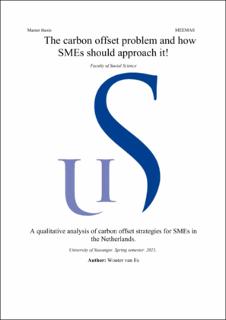| dc.description.abstract | Small and medium-sized enterprises (SMEs) often lack the resources and knowledge to navigate the voluntary carbon offset market (COM), which is characterized by uncertainty, unclear regulations, and opaque practices. However, as SMEs account for a large share of global emissions, it is crucial to encourage and enable them to take actions to reduce their carbon footprint. This thesis aims to provide SMEs with a better understanding of carbon offsetting, the problems associated with it, and how to choose the most effective strategy. The thesis includes a literature review of the background of Carbon Dioxide (CO2) offsetting, including the different types of CO2 markets and the history of mandatory and voluntary carbon offset policies. The expected future of carbon offset policies is also discussed. Carbon offsetting has been developed as a market-based mechanism to reduce Greenhouse Gas (GHG) emissions. It allows companies and individuals to offset their own emissions by investing in projects that reduce emissions elsewhere. There are two types of carbon markets, namely mandatory and voluntary. Mandatory carbon markets are implemented through government regulations, while the voluntary carbon market (VCM) is driven by companies and individuals who choose to offset their emissions voluntarily. The history of mandatory carbon offset policies can be traced back to the Kyoto Protocol, which established the Clean Development Mechanism (CDM). This mechanism allowed developed countries to offset their emissions by investing in emissions reduction projects in developing countries. However, there were many issues with the CDM, such as the potential for double counting and the lack of additionality (projects financed with offset funds that would also happen without these funds). Voluntary carbon offset policies have been developed by companies and individuals who wish to reduce their carbon footprint voluntarily. This market has grown rapidly in recent years, but it is characterized by a lack of transparency and regulation, making it difficult for SMEs to navigate. The potential risks associated with voluntary carbon offsetting include the quality and sustainability of offset projects, non-additionality, and the potential negative impacts on environments and people located near the offset projects. To address the challenges associated with carbon offsetting for SMEs, this thesis uses the multi-criteria decision analysis (MCDA) framework to evaluate and select the most appropriate carbon offsetting strategy. The MCDA model is based on the identification of key decision criteria, including cost, transparency, and environmental impact, as well as the development of weightings and scoring for each criterion. The thesis concludes with recommendations for SMEs to address the challenges of carbon offsetting, such as engaging in due diligence, verifying the quality of offset projects, and considering the long-term sustainability of their offsetting strategy. The proposed MCDA framework can be used by SMEs to evaluate their carbon offsetting options and select the most appropriate strategy based on their specific needs and priorities. In conclusion, this thesis provides SMEs with a better understanding of the COM, the challenges associated with carbon offsetting, and how to choose the most effective strategy. The proposed MCDA framework can assist SMEs in making informed decisions about their carbon offsetting practices, leading to a more sustainable and environmentally responsible business ecosystem. | |
